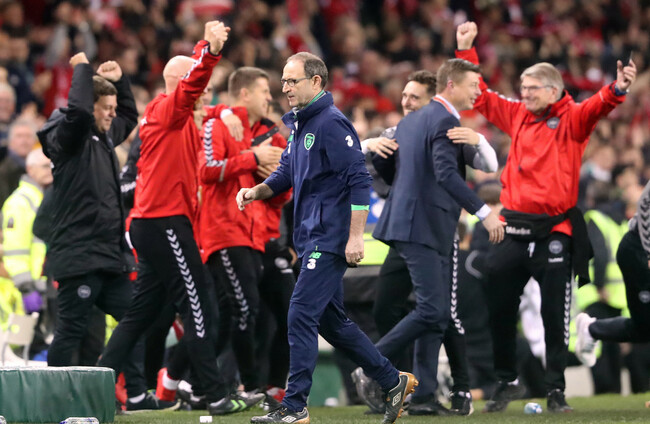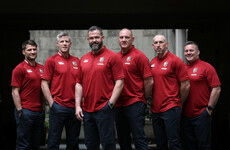“WE CAN FIGHT back… Thank you.”
Martin O’Neill bade farewell to Tony O’Donoghue on Tuesday night with a politeness not in keeping with the rest of their interview, in which the manager, as is now traditional after a bad result, consoled himself by slapping the RTÉ man about a bit.
But can he fight back?
The mind wandered to another 5-1 defeat earlier in O’Neill’s managerial career. It was November 2000, ‘Who Let The Dogs Out?’ was topping the charts and O’Neill’s opening months as Celtic manager could not have gone much better. They’d hammered Rangers 6-2 in September and took a 15 point lead to Ibrox for the second Old Firm derby of the season. The Daily Record takes up the story:
“The wonderful if fragile fantasy Celtic had been living was torn to shreds at Ibrox yesterday by Dick Advocaat’s born-again team, who finally gave their supporters reason to believe… O’Neill’s intention to kill off Rangers’ championship hopes was clear in his team selection…[but] while O’Neill’s mid-division possessed enough skill they had little in the way of steel.”
A few weeks later O’Neill signed Neil Lennon from his former club Leicester City. Pugnacious, spiky, but clever, Lennon was O’Neill’s on-field lieutenant, and his Celtic team would never again lack for steel.
O’Neill of Celtic responded to a cataclysmic hammering by buying in what he didn’t have; O’Neill of Ireland hasn’t got that option. His successes at club level, as much as his fabled man-management, were built on just such examples of team construction. But like all international managers, his current job is about making the most of what you’ve got.
From what we know about how O’Neill, shall we say, ‘empowers’ his players to look after team shape and tactical structure on the pitch, it’s clear his management style depends heavily on on-field leadership: a cohort of grizzled pros who look after the tiresome details of what the players are actually supposed to be doing.
Handing the Ireland captain’s armband to David Meyler — a player hitherto rarely good enough to make the team, and expendable enough to make way at half-time on Tuesday — highlights how remarkably ill-stocked O’Neill is in one of his most-prized virtues.
Indeed, the manager may spend the long months of contemplation before 2018′s thrilling friendly schedule rueing the absence of Seamus Coleman, the squad’s spiritual leader, and Jonathan Walters from the decisive World Cup qualifiers.
Walters in particular fits the template of the sort of player O’Neill used to fill his teams with: Ornery, battling bastards with street smarts who could play a bit. See Lennon, Chris Sutton, John Hartson and Alan Thompson at Celtic, or his entire squad at Leicester, save for Steve Guppy, whose job it was to feed crosses for the ornery, battling bastards to head.
It’s arguable that those sort of self-sufficient warhorses do not exist anymore even if O’Neill were able to recruit them, perhaps explaining the diminishing returns of his detail-light approach in today’s game.
But it’s not just the absence of a redemptive cheque book that suggests O’Neill may not fight back from this one. The story of every Republic of Ireland manager seems to follow the familiar theatrical arc, and it is sad to report that O’Neill may have entered his third act.
It comes to them all. The opening spell for an Ireland manager is like the ‘meet cute’ in a Hollywood rom-com, played out to the soundtrack of Herman’s Hermits singing ‘I’m Into Something Good’. Manager, team and football public are blissfully entwined, finding delight even in each other’s flaws and foibles. The duration of this period can vary — For Big Jack it lasted about seven years, for Stan about seven weeks.
Then there’s the middle bit, when the flaws and foibles become irritating but haven’t boiled over into full-on resentment. See Trapattoni’s rigidity or Kerr’s fastidiousness. Low-level media grumbles about the style of play and whether the manager is getting the best out of the players are quelled by decent results; fans are still on board, especially if there’s a tournament involved.
And then there’s the endgame. This can be sudden and decisive: Mick McCarthy was gone just months after Saipan and reaching the knockout stages of a World Cup, a clear case of winning the war but losing the peace. But more often it is drawn out, sometimes sad, usually bitter and never pleasant. Something gets broken between manager and players and public and it is just a matter of time.
Trap had the 6-1, Stan had Cyprus, Jack had the Harry Ramsden’s Challenge. That moment might have come for O’Neill with the flipping up of seats at the Aviva on Tuesday night. Fans who had scavenged for tickets in the days before the Denmark game deserted the team en masse. Players lay prostrate on the pitch, devastated and demoralised, O’Neill’s gameplan and tactics failing them disastrously, their own limitations cruelly exposed.
O’Neill asks only to be judged by results and Tuesday’s was as bad as they come, though there is enough on the other side of this manager’s ledger over his four years in charge to keep him gainfully employed. But with a card of Uefa Nations League fixtures to sell, O’Neill’s employers will be alive to signs of an unresponsive squad and an apathetic fanbase.
All political lives end in failure and the same is true for Republic of Ireland managers; though as Tony would attest, O’Neill is unlikely to go without a fight.
The42 has just published its first book, Behind The Lines, a collection of some of the year’s best sports stories. Pick up your copy in Eason’s, or order it here today (€10):












Great win , 3 more points while our opponents have a few suspension s to contend with . A good week end . Hail Hail
I thought it was a poor performance but job done
@John O Reilly: big 3 points